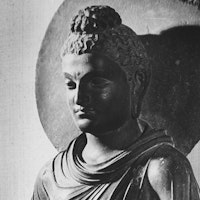If one speaks or acts with a pure thought, happiness follows one, like a shadow that never leaves.
Gautama Buddha

Happiness Follows
Topic: Joy & Happiness
All that we are is the result of what we have thought. It is founded on our thoughts. It is made up of our thoughts. If one speaks or acts with a pure thought, happiness follows one, like a shadow that never leaves.
Gautama Buddha, also known as Siddhartha Gautama, was a spiritual teacher and the founder of Buddhism. Born in the 6th century BCE in Lumbini, now modern-day Nepal, he was destined for greatness. At the age of 29, he renounced his luxurious life as a prince and embarked on a spiritual quest to find the ultimate truth about human suffering and the nature of existence.
After years of intense meditation and self-discipline, Gautama attained enlightenment under a Bodhi tree in Bodh Gaya, India, at the age of 35. He became the Buddha, which means "the awakened one" or "the enlightened one." Gautama Buddha spent the rest of his life teaching the Four Noble Truths and the Eightfold Path, which formed the core principles of Buddhism. His teachings emphasized the importance of overcoming desire and attachment to achieve liberation from suffering. Known for his compassion and wisdom, Gautama Buddha's teachings have had a profound impact on millions of people worldwide, inspiring them to seek inner peace and spiritual enlightenment. His legacy as a spiritual leader and philosopher continues to resonate and guide individuals on their spiritual journeys to this day.
Dhammapada
Müller F. Max, and Jack Maguire. Dhammapada: Annotated & Explained Translation by Max Muller ; Annotation by Jack Maguire. SkyLight Paths Pub., 2002, [Dhammapada 2]

Gautama Buddha
Theme: Happiness and Well-being

About This Gautama Buddha Quotation from Dhammapada 2 [Commentary]
Dhammapada 1-2
Huston Smith [excerpt from The World’s Religions, Buddhism, the Eightfold Path]
Buddhism & Happiness
Equanimity: Peace of Mind & Happiness
Resources
Related Quotes
Copyright © 2017 – 2026 LuminaryQuotes.com About Us